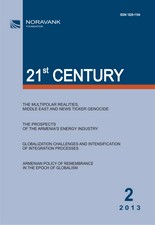 18.12.2013
18.12.2013
"21st CENTURY", Nо. 2, 2013
«Նորավանք» ԳԿՀ-ի կողմից լույս է ընծայվել «21st CENTURY» վերլուծական հանդեսի 2013թ. 2-րդ համարը։ Անգլերեն հրատարակվող հանդեսի ս/թ վերջին համարում տեղ գտած հոդվածներից մի քանիսում լուսաբանվում են գլոբալացման պայմաններում տեղի ունեցող որոշ գործընթացներ, որոնցից են` մերձավորարևելյան խռովությունների վերածումը նորատեսակ ցեղասպանության (Գ. Հարությունյան), ՀՀ էներգետիկայի հեռանկարներն ինտեգրացիոն նախագծերի համատեքստում (Ս. Սարուխանյան), գլոբալացման մարտահրավերները և ինտեգրացիոն գործընթացների հզորացումը (Բ. Հուսաինով) և գլոբալիզմի դարաշրջանում հիշողության հայկական քաղաքականությունը (Մ. Դաբաղ)։ Համարում քննարկվող մշակութային, քաղաքական և սոցիալական այլ հարցերի թվում են` տեղանունների կարևորությունը ազգային անվտանգության համար (Է. Դանիելյան), հանրային կառավարման նոր սկզբունքները Հայաստանի քաղաքական վերափոխման գործընթացում (Մ. Մարգարյան, Կ. Գալոյան) և սոցիալական կապիտալի ձեռք բերումը իմաստության միջոցով (Ա. Մ. Շահսավարանի)։
Ստորև ներկայացնում ենք հոդվածների համառոտագրերը անգլերեն։
Գագիկ Հարությունյան
ԲԱԶՄԱԲԵՎԵՌ ԻՐՈՂՈՒԹՅՈՒՆՆԵՐԸ, ՄԵՐՁԱՎՈՐ ԱՐԵՎԵԼՔԸ ԵՎ ՑԵՂԱՍՊԱՆՈՒԹՅՈՒՆԸ՝ «ՎԱԶՈՂ ՏՈՂԻ» ՌԵԺԻՄՈՎ
|
Համառոտագիր
|
| Today hardly anyone would contest the fact that scrambling for spheres of influence on the world-scale, which started at the end of 20th century with monopole domination, now transforms into a multi-vector persistent standoff. It takes place by some new rules (sometimes no rules) of multipolar world order that have not been fully established yet and hence, are still more than vague. This new order is first of all characterized by the circumstance that the United States remains the world leader, but no longer is the hegemon. Interestingly, some even predict breakdown of the superpower, among which are not only somewhat opinionated characters, such as Paul C. Roberts, former Assistant Secretary of the Treasury in the Reagan Administration (one of the fathers of Reaganomics) and Gerald Celente, Director of the Trends Research Institute, but also some renowned university professors (see, for example). |
Սևակ Սարուխանյան
ՀԱՅԿԱԿԱՆ ԷՆԵՐԳԵՏԻԿԱՅԻ ՀԵՌԱՆԿԱՐՆԵՐՆ ԻՆՏԵԳՐԱՑԻՈՆ ՆԱԽԱԳԾԵՐԻ ՀԱՄԱՏԵՔՍՏՈՒՄ
|
Համառոտագիր
|
The energy security has always played a key role in the system of national security of Armenia. The reason for this was the events of 1990s, when Armenian energy sector suffered the most from the collapse of USSR. Following to the conflict in Nagorno-Karabakh the energy supplies through the territory of Azerbaijan (by pipelines and railway) were halted, and since early 1990s the only remaining supply route was the one through Georgia, which had been regularly suffering political crises.
Prompted by the crisis of 1990s, the stability of the energy system has become a priority for the country’s policy on protection of the national security, which is reflected in the National Security Strategy of the Republic of Armenia. This document refers to Armenian-Russian relations as one of the factors ensuring the energy independence of Armenia. |
Բուլատ Հուսաինով
ԳԼՈԲԱԼԱՑՄԱՆ ՄԱՐՏԱՀՐԱՎԵՐՆԵՐԸ ԵՎ ԻՆՏԵԳՐԱՑԻՈՆ ԳՈՐԾԸՆԹԱՑՆԵՐԻ ՈՒԺԵՂԱՑՈՒՄԸ
|
Համառոտագիր
|
Interrelation of globalization and regional integration becomes a rather topical problem in the modern world. Globalization, which is a multifaceted and contradictive process of global economy development, engenders new integration blocs and unions. Regional integration is a complex process considerably depending on peculiarities of each specific case, where no rules exist, which would have been both universal and practical simultaneously for carrying out policy in regard to the integration agreements.
Dialectic of globalization and integration processes interaction shows that on one hand, establishment of integrative unions is a natural reaction to the negative effects of globalization that especially intensify under uncertainties of the world economic system, and on the other hand, it is a specific manifestation of an objective trend towards creation of a comprehensive global system of equitable partnership. |
Միհրան Դաբաղ
ՀԻՇՈՂՈՒԹՅԱՆ ՀԱՅԿԱԿԱՆ ՔԱՂԱՔԱԿԱՆՈՒԹՅՈՒՆԸ ԳԼՈԲԱԼԻԶՄԻ ԴԱՐԱՇՐՋԱՆՈՒՄ
|
Համառոտագիր
|
Karl Marx had once noted: “Interest has no memory, for it thinks only of itself”. Whoever does not remember about oneself, thus effectively forgetting historical prerequisites of own actions, may pursue one’s own interest ruthlessly and without any regard to the consequences.
Hence, in the political and historical context absence of memory means absence of conscience. Arguably, it can be stated that only the riddance of memory opens arena for political action, because it relieves of historical responsibility. |
Էդուարդ Լ. Դանիելյան
ՀԱՅԿԱԿԱՆ ՏԵՂԱՆՈՒՆՆԵՐԻ ԳՈՅԱԲԱՆԱԿԱՆ ԱՄԲՈՂՋԱԿԱՆՈՒԹՅԱՆ ԿԱՐԵՎՈՐՈՒԹՅՈՒՆԸ ԱԶԳԱՅԻՆ ԱՆՎՏԱՆԳՈՒԹՅԱՆ ՀԱՄԱԿԱՐԳՈՒՄ
|
Համառոտագիր
|
| Armenian toponyms of the Armenian Highland constitute an essential part of Armenia’s historical resources. They symbolize the indigenous Armenian Nation’s cultural creation - the backbone of the Armenian statehood having more than five millennia old ethno-spiritual and civilizational roots testified by archaeological monuments1 and architectural relics, petroglyphs and cuneiform inscriptions et al. |
Մարիամ Մարգարյան, Կարեն Գալոյան
ՀԱՆՐԱՅԻՆ ԿԱՌԱՎԱՐՄԱՆ ՆՈՐ ՍԿԶԲՈՒՆՔՆԵՐԻ ԿԵՆՍԱԿԱՆՈՒԹՅՈՒՆԸ ՀԱՅԱՍՏԱՆԻ ՀԱՆՐԱՊԵՏՈՒԹՅՈՒՆՈՒՄ ՔԱՂԱՔԱԿԱՆ ՎԵՐԱՓՈԽՄԱՆ ԳՈՐԾԸՆԹԱՑՈՒՄ
|
Համառոտագիր
|
| The processes aimed at the creation of a new political system after the dissolution of the Soviet Union in 1991 prove, indeed, that the modern world has entered into a completely new stage of political transformation. The profound geopolitical changes have posed a challenge to the Armenian society – to perceive the principles of the citizen-state dialogue in a new manner, based on the necessity to preserve its own identity. The processes of democratic transformation implies establishment of democratic values. Meanwhile, democratization is often characterized as a systemized open infinity or an organized uncertainty. Therefore, the political process in transitional societies is extremely complicated and contradictory. The empirical analysis of the modern Armenian society has not yet started and its category apparatus has not been devised either. However, as history shows, in modernizing societies it is the logic of the political process that makes up the nature of transformations. |
Ամիր Մոհամադ Շահսավարանի
ԻՄԱՍՏՈՒԹՅԱՆ ՈՒՍՈՒՑՈՒՄԸ ՈՐՊԵՍ ՍՈՑԻԱԼԱԿԱՆ ԿԱՊԻՏԱԼԻ ԿՈՒՏԱԿՄԱՆ ՌԱԶՄԱՎԱՐՈՒԹՅՈՒՆ
|
Համառոտագիր
|
During the last two decades, the societal construct of social capital has been used increasingly for explaining social development and evolution, along with concepts such as physical capital, human capital, knowledge, and entrepreneurship - especially in reference to today’s innovation-driven era (Putnam, 1993; Coleman, 1988).
Indeed, social capital has been framed as an extension or further improvement to, especially economic approaches, specifying a social component to more conventionally limited perspectives on drivers of economic development (Audretsch, & Keilbach, 2004; Putnam, 2000). Social capital has been formulated as an important determinant of economic development by referring to relations among actors, such as social networks, trust, and civic participation (Dakhli, & de Clercq, 2004). |
Բաժանորդագրությունը` www.pressinfo.am, Հայմամուլ
Գնումը`«Նորավանք» ԳԿՀ-ում
Հասցեն՝ ք.Երևան, Գարեգին Նժդեհի 23/1,
Հեռ. +374 10 44 04 73, +374 93 54 31 71
 18.12.2013
18.12.2013


